ill LYTeracy: Revisiting David Lynch’s Dune
I think, and hope, we have room on this site for longer think-pieces that aren’t necessarily tied to breaking news. I’m sure you’ll all let me know.
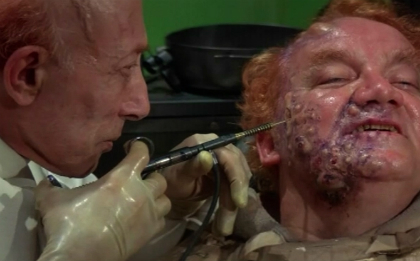 |
| Is this what it feels like to sit through Dune? |
Prior to last week, I had watched the 1984 movie Dune exactly once – in a theater, when it came out. At the time, all I knew about it was that it looked amazing and epic, and I was excited to visit new worlds. I also had the idea that it was pretty cool for some dude to name himself “Sting” and play the bad guy. Needless to say, I had no idea who Jose Ferrer or Jurgen Prochnow were, let alone Virgina Madsen or then-unknown Kyle MacLachlan (I think I knew Linda Hunt as one of the voices from The Last Unicorn, which I had hated, and may perhaps need to revisit someday).
I came out thoroughly disappointed. Had I been able to write an articulate review back then, it might have gone something like this:
“This is terrible! The good guy just kills all the bad guys with no problem, he has a voice that can make them do anything, he falls in love with this one girl just so they can have some kissing in it, and it’s trying to be like a Bible story or something, except Jesus didn’t kill like that.” That said, certain things stuck with me – floating, pus-faced Baron Harkonnen made for a memorable image, as did that Third-Stage Guild Navigator mutant in the beginning. The sandworms had been hyped as one of the movie’s big surprises, but honestly, they looked like giant worms; so what? Later, I tried to read the book; finding it too similar to the movie in the early chapters, I gave up, though I did end up reading all of the considerably shorter parody, National Lampoon’s Doon, in which spice and sandworms were replaced with beer and pretzels.
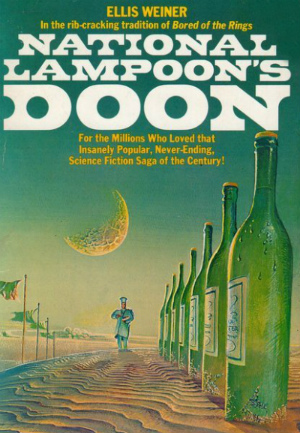 |
| The back cover had hamburgers as flying saucers |
Now I’m older. And I revere the movie’s director, an at-the-time obscure auteur by the name of David Lynch. If somebody told me nowadays that David Lynch was about to make an epic sci-fi movie about a Messiah fable, I’d be all over it. Since he already did, however, I decided that there might be a chance of redemption. So when Dune showed on HBO recently, I DVR’ed it, ready for a revisit. Because I don’t always love Lynch, but I usually respect him. Likewise, Kyle MacLachlan had long since won a place in my heart as Agent Cooper, and that little-known English thespian Patrick Stewart had made something of himself as well. As for Sting…let me just try and remember the days when he really was cool.
So I watched. And like the preteen version of myself, I was initially hooked. And then…
Honestly, I’m convinced this movie would be much more of a hardcore cult hit today if it would just shut the fuck up for a second every now and then. Critics at the time labeled it “confusing”; I don’t see how, considering that you hear what everyone is thinking, all the time, and they repeat their key thoughts constantly so that their actual acting never has to do the job of telling the story. On top of that, we get additional narration by Princess Irulan (Madsen), a character who is not privy to any of the events actually happening (the books tell us she married MacLachlan’s character Paul and wrote many volumes about him; the movie neglects this key detail).
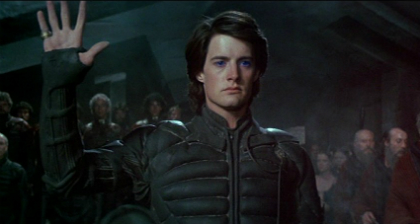 |
| “Hold it. Before you go further, remember me in Twin Peaks…” |
With that aside – and it really is nigh-impossible to put that aside – Dune actually isn’t a bad movie. Its allegory factor is interesting today; nobody at the time could have known this fully, but a movie about a desert rich in resources that’s owned by an emperor named Shaddam who hates the local tribes – and wants to pit the super-power empires against each other – seems timelier than ever. Of course, for that allegory to carry through, George W. Bush would have had to gay-marry Uday or Qusay at the end, so it only goes so far.
My younger self had legitimate complaints, and also failed to appreciate some of the subtleties. Let’s debate.
Younger me: “The good guy just kills all the bad guys with no problem.”
2012 me: “What makes you so sure he’s the good guy?”
Granted, the story structure is one that certainly makes Paul Atreides the protagonist. But if you look at everything in the movie, nowhere does it say or even indicate that the Atreides family are inherently good. Granted, the Harkonnens like to torture animals, and they’re all gingers, which is good enough to define their evil if you’re named Eric Cartman. So their rivals who do nothing quite like that may seem better, even though they’re secretly developing sound weapons. But part of what I like about the movie now is that there are no good guys in it. Everybody’s hands are dirty, and it seems clear that if the film series had been continued, Paul would have amply demonstrated his flaws later on (not having read subsequent books, I don’t know for sure how that suspicion plays out). The fact that he can’t just kill Feyd, but must then use his divine power to split him apart, suggests absolute power corrupting absolutely.
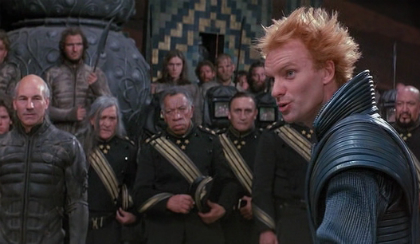 |
| Every spice you take, every dune you rake, I’ll be watching you |
Younger me: “He falls in love with this one girl just so they can have some kissing in it.”
2012 me: “Yeah, pretty much.”
Seriously, I imagine Chani actually has a story purpose in the books, but here, she’s a prop just so Paul can kiss somebody. His line “I’ve always loved you,” based on the fact that he fell for her in advance in his dreams, is totally lame as it plays.
Younger me: “He has a voice that can make them do anything.”
2012 me: “It’s more limited than you think.”
As a kid, I totally misread the scene where creepy kid Alia (Alicia Witt, in her very first role) lures the Baron close to her. She isn’t actually using the voice, but she is secretly wielding a poison talon. The voice, like the Force, seems to only work on the weaker-minded in limited situations.
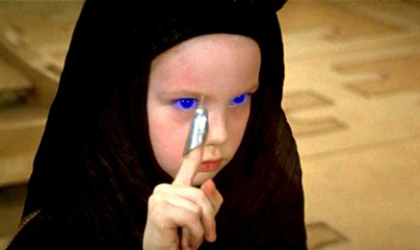 |
| Totally hot nowadays. We’d never have called it back then. |
Younger me: “It’s trying to be like a Bible story or something, except Jesus didn’t kill like that.”
2012 me: “Actually, that’s the point, and the director seems to know it.”
I’m aware that in the books, the Messiah prophecy turns out to have less-than-mystical origins. The film doesn’t make that apparent, but there are very subtle hints – if the characters would stop thinking out loud so much, you might be able to stop and see them.
All that aside, there are definite fingerprints of Lynch to be found. The entire subplot of creepy preemie Alia, including in-vitro shots of the fetus becoming sentient (how was this not R-rated, again?). The clitoris-face of Carlo Rambaldi’s amazing Third-Stage mutant. Paul’s dream sequences, which cleverly use ’80s technology in a way that doesn’t look dated (even the CG Battle Shields fight looks weird rather than old, which is good). The way Irulan’s face fades in and out when she delivers the studio-mandated exposition at the beginning. I do think it’s the only Lynch movie where somebody doesn’t have a massive crying scene, but I could be wrong.
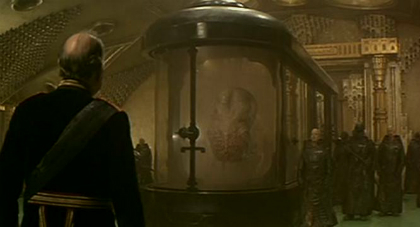 |
| Yep, THIS is David Lynch at work |
The production design is still holy-shit amazing. And I love what’s being set up here: a full-on sci-fi universe fleshed out on a grand scale that’s predominantly dark and perverse is a radical notion, one that the Riddick movies haven’t quite managed to realize either.
But MacLachlan, however much he may have won me over since, is still a terrible lead. He’s fine as a dorky heir, but once he starts talking about “the Weirding Way” (a.k.a. martial arts) and being Messianic, he sounds like Derek Zoolander. He wasn’t ready to star in a big event movie, and it showed both then and now. Oh yeah, the guitar riffs on the soundtrack by Toto are badly dated as well, though Brian Eno’s main theme holds up.
With that said, I suspect the way to watch it henceforth will be with foreign-language audio. The incessant talking will seem more profound that way.
